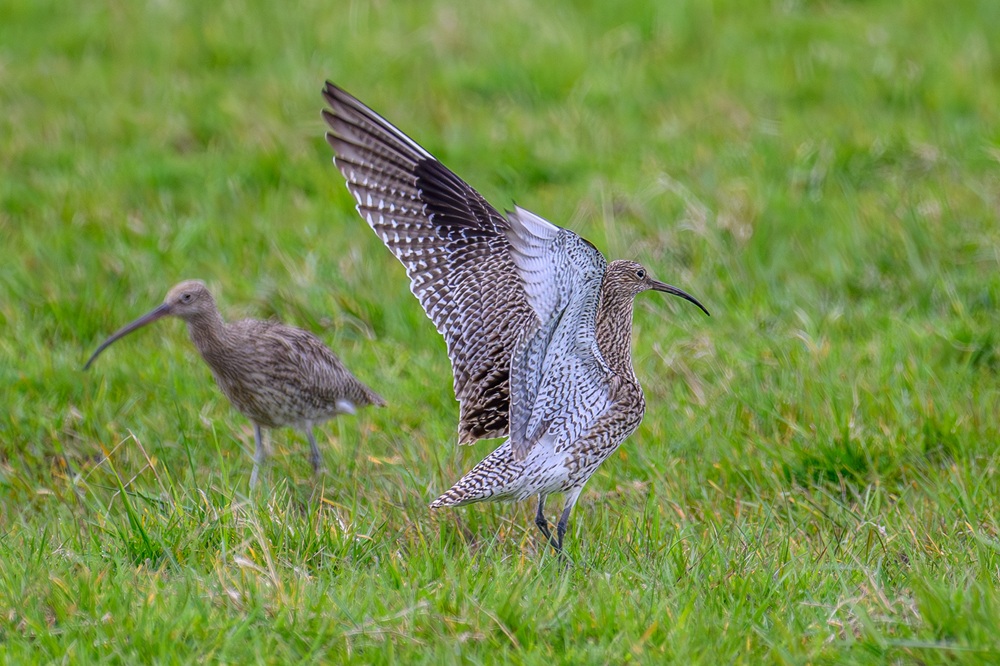New conservation efforts underway to save one of Wales’ most endangered birds

New conservation efforts are underway to save one of Wales’ most endangered birds – the curlew.
Their distinguishing cur-lee calls often referred to as the ‘herald of spring’ were once a common theme along Wales’ coasts and farmed landscapes.
But as is common across other nations in the UK and elsewhere in Europe, breeding curlew in Wales are in significant decline.
The curlew uses relatively large areas within both Wales’ upland and lowland landscapes to breed and feed during the spring and summer.
But changes to modern farming practices, leading to earlier cutting dates for hay and silage, mean that the curlew have less time to allow chicks to fledge.
High predation rates of eggs and chicks is also reducing breeding success and driving population declines.
Conservation
Work is being carried out in Bannau Brycheiniog National Park to tackle key issues like habitat loss, unfavourable habitat management and predator control.
The site has been earmarked as one of Wales’ important curlew areas through Curlew Connections – a wader conservation project supported by the Welsh Government.

Work being carried out in the area to protect the species includes monitoring and understanding curlew populations, implementing nest protection, predator management and habitat works.
The £999,600 Nature Networks funded partnership is being delivered by the Game & Wildlife Conservation Trust on behalf of Gylfinir Cymru.
‘Brink’
To mark the start of Wales Nature Week, Deputy First Minister with responsibility for Climate Change and Rural Affairs Huw Irranca-Davies visited the site to see the work being carried out there.
He said: “Protecting and enhancing our environment and natural resources is key to addressing the climate and nature emergencies – and Wales Nature Week is a fantastic opportunity for people of all ages to get involved and make a difference.
“The curlew, for example, is predicted to be on the brink of extinction as a viable breeding species in Wales by 2033, so I fully understand the urgency of action needed to secure this species’ survival.
“In this Senedd term alone, we have invested more than £150m to restore nature and improve access. It’s fantastic to see for myself just some of the projects that are benefitting and helping to make a real difference.”
Wales Nature Week (5-13 July 2025) is an annual celebration of wildlife and habitats focused on enjoying, valuing and protecting nature in Wales.
The programme features nature festivals, guided walks and wildlife workshops hosted by Local Nature Partnerships and other nature-friendly organisations, many of which are free to attend.
Support our Nation today
For the price of a cup of coffee a month you can help us create an independent, not-for-profit, national news service for the people of Wales, by the people of Wales.






‘But as is common across other nations in the UK and elsewhere in Europe, breeding curlew in Wales are in significant decline.’ Sad to hear that curlews are in such decline. Less than forty years ago we regularly used to take our kids – then small – to stay on a caravan site on the Fylde in Lancashire. The site was only a few hundred yards from the river Wyre estuary, and we routinely used to hear the wild exultant calls of curlews, especially morning and evening. More recently we lived for some years in the far south-easterly reaches of… Read more »
The problem relates to habitat and when the Labour administration. They replaced TirGofal, the agricultural scheme that included incentives for stuff like hay meadows and fallow areas, and replaced it with Glastir, which shifted the emphasis into misinformed carbon reduction priorities. In simple terms it meant that a farmer now has to crop the whole field for silage where previously there was an incentive to leave strips or margins ideal for Curlew (and other wildlife) habitat. Instead of spaffing £150m “to restore nature and improve access” gobbled up by fleece jacket lifestyle squatters it would be better to augment an… Read more »
Leave all of the conservation and habitat management to gamekeepers, the RSPB have failed yet again this year on the moors they have taken over.